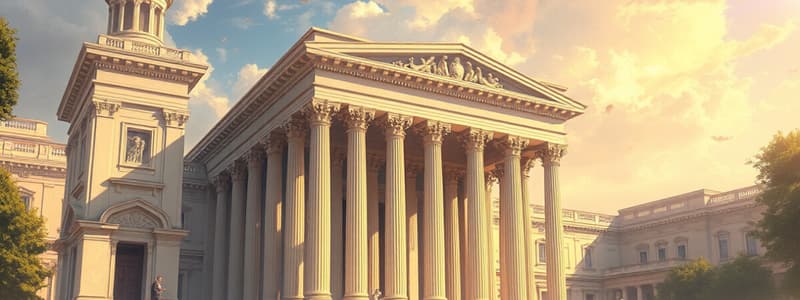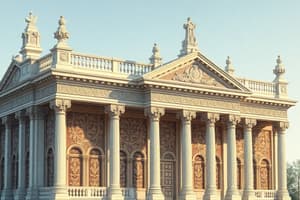Podcast
Questions and Answers
What is Neoclassical Architecture?
What is Neoclassical Architecture?
- An architectural style that only uses modern materials
- A revival of classical architecture that took place in the 1800s and early 1900s (correct)
- A type of architecture that incorporates Gothic elements
- Architecture that avoids symmetry
What are the characteristics of Neoclassical Architecture?
What are the characteristics of Neoclassical Architecture?
Geometric forms, columns, and blank walls
Which building is a well-known example of Neoclassical Architecture?
Which building is a well-known example of Neoclassical Architecture?
- The Eiffel Tower
- The Sydney Opera House
- The White House (correct)
- Burj Khalifa
Name another example of Neoclassical Architecture apart from The White House.
Name another example of Neoclassical Architecture apart from The White House.
Neoclassical buildings can be categorized into three types: temple, ________, and classical block.
Neoclassical buildings can be categorized into three types: temple, ________, and classical block.
What is a palladian building inspired by?
What is a palladian building inspired by?
Neoclassical architecture flourished only in the United States.
Neoclassical architecture flourished only in the United States.
What key features define a temple in Neoclassical architecture?
What key features define a temple in Neoclassical architecture?
Which of the following is NOT a type of Neoclassical building?
Which of the following is NOT a type of Neoclassical building?
Flashcards are hidden until you start studying
Study Notes
Introduction to Neoclassical Architecture
- Neoclassical Architecture is a significant and influential architectural style.
- It emerged as a revival of classical architecture in the 1800s and early 1900s.
Characteristics of Neoclassical Architecture
- Defined by geometric forms, columns, and blank walls.
- Strongly inspired by the architectural styles of ancient Greece and Rome.
- Prominent in both the United States and Europe.
Geographic Presence
- Major examples can be found in cities such as Washington DC, London, and Berlin.
- This architecture style is integral to the identity of many prominent urban landscapes.
Notable Examples
- The White House, known for its classical columns, symmetrical design, and triangular pediment.
- The US Capitol Building features similar neoclassical elements, including a grand domed roof.
- The Pantheon in Paris exemplifies the style through its use of columns and symmetrical proportions.
Types of Neoclassical Buildings
- Three primary types include temples, palladians, and classical blocks:
- Temples: Modeled on ancient structures, often featuring a peristyle (a row of columns surrounding the building).
- Palladians: Derived from the work of Andrea Palladio, characterized by three openings with the central arched opening being larger.
- Classical Blocks: Rectangular buildings with flat roofs, embellished with classical design details.
Conclusion
- Neoclassical Architecture remains relevant today with its roots in the designs of the Greeks and Romans.
- The architecture is categorized into three main types: temples, palladian structures, and classical blocks.
Studying That Suits You
Use AI to generate personalized quizzes and flashcards to suit your learning preferences.




